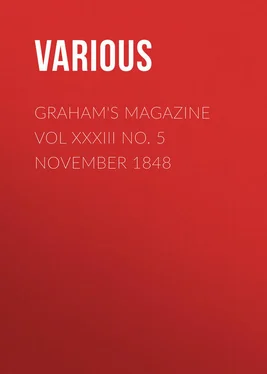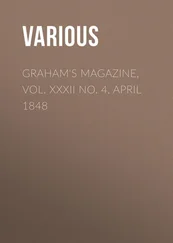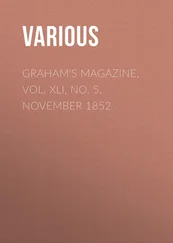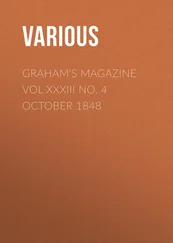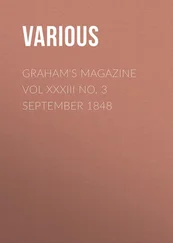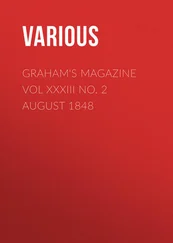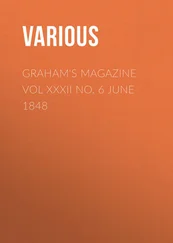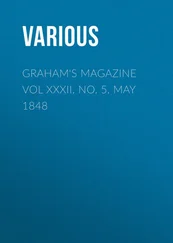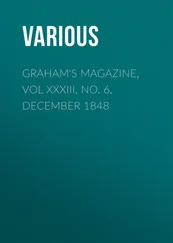Various - Graham's Magazine Vol XXXIII No. 5 November 1848
Здесь есть возможность читать онлайн «Various - Graham's Magazine Vol XXXIII No. 5 November 1848» — ознакомительный отрывок электронной книги совершенно бесплатно, а после прочтения отрывка купить полную версию. В некоторых случаях можно слушать аудио, скачать через торрент в формате fb2 и присутствует краткое содержание. Издательство: Иностранный паблик, Жанр: periodic, literature_19, foreign_edu, на английском языке. Описание произведения, (предисловие) а так же отзывы посетителей доступны на портале библиотеки ЛибКат.
- Название:Graham's Magazine Vol XXXIII No. 5 November 1848
- Автор:
- Издательство:Иностранный паблик
- Жанр:
- Год:неизвестен
- ISBN:нет данных
- Рейтинг книги:5 / 5. Голосов: 1
-
Избранное:Добавить в избранное
- Отзывы:
-
Ваша оценка:
- 100
- 1
- 2
- 3
- 4
- 5
Graham's Magazine Vol XXXIII No. 5 November 1848: краткое содержание, описание и аннотация
Предлагаем к чтению аннотацию, описание, краткое содержание или предисловие (зависит от того, что написал сам автор книги «Graham's Magazine Vol XXXIII No. 5 November 1848»). Если вы не нашли необходимую информацию о книге — напишите в комментариях, мы постараемся отыскать её.
Graham's Magazine Vol XXXIII No. 5 November 1848 — читать онлайн ознакомительный отрывок
Ниже представлен текст книги, разбитый по страницам. Система сохранения места последней прочитанной страницы, позволяет с удобством читать онлайн бесплатно книгу «Graham's Magazine Vol XXXIII No. 5 November 1848», без необходимости каждый раз заново искать на чём Вы остановились. Поставьте закладку, и сможете в любой момент перейти на страницу, на которой закончили чтение.
Интервал:
Закладка:
CHAPTER V
Let us now return to Olivolo, to the altar-place of the church of San Pietro di Castella, and resume the progress of that strangely mingled ceremonial – mixed sunshine and sadness – which was broken by the passionate conduct of Giovanni Gradenigo. We left the poor, crushed Francesca, in a state of unconsciousness, in the arms of her sympathizing kindred. For a brief space the impression was a painful one upon the hearts of the vast assembly; but as the deep organ rolled its ascending anthems, the emotion subsided. The people had assembled for pleasure and an agreeable spectacle; and though sympathizing, for a moment, with the pathetic fortunes of the sundered lovers, quite as earnestly as it is possible for mere lookers-on to do, they were not to be disappointed in the objects for which they came. The various shows of the assemblage – the dresses, the jewels, the dignitaries, and the beauties – were quite enough to divert the feelings of a populace, at all times notorious for its levities, from a scene which, however impressive at first, was becoming a little tedious. Sympathies are very good and proper things; but the world seldom suffers them to occupy too much of its time. Our Venetians did not pretend to be any more humane than the rest of the great family; and the moment that Francesca had fainted, and Giovanni had disappeared, the multitude began to express their impatience of any further delay by all the means in their possession. There was no longer a motive to resist their desires, and simply reserving the fate of the poor Francesca to the last, or until she should sufficiently recover to be fully conscious of the sacrifice which she was about to make, the ceremonies were begun. There was a political part to be played by the Doge, in which the people took particular interest; and to behold which, indeed, was the strongest reason of their impatience. The government of Venice, as was remarked by quaint and witty James Howell, was a compound thing, mixed of all kinds of governments, and might be said to be composed of "a grain of monarchy, a dose of democracy, and a dram , if not an ounce of optimacy." It was in regard to this dose of democracy, that the government annually assigned marriage portions to twelve young maidens, selected from the great body of the people, of those not sufficiently opulent to secure husbands, or find the adequate means for marriage, without this help. To bestow these maidens upon their lovers, and with them the portions allotted by the state, constituted the first, and in the eyes of the masses, the most agreeable part of the spectacle. The Doge, on this occasion, who was the thrice renowned Pietro Candiano, "did his spiriting gently," and in a highly edifying manner. The bishop bestowed his blessings, and confirmed by the religious, the civil rites, which allied the chosen couples. To these succeeded the voluntary parties, if we may thus presume upon a distinction between the two classes, which we are yet not sure that we have a right to make. The high-born and the wealthy, couple after couple, now approached the altar, to receive the final benediction which committed them to hopes of happiness which it is not in the power of any priesthood to compel. No doubt there was a great deal of hope among the parties, and we have certainly no reason to suppose that happiness did not follow in every instance.
But there is poor Francesca Ziani. It is now her turn. Her cruel parents remain unsubdued and unsoftened by her deep and touching sorrows. She is made to rise, to totter forward to the altar, scarcely conscious of any thing, except, perhaps, that the worthless, but wealthy, Ulric Barberigo is at her side. Once more the mournful spectacle restores to the spectators all their better feelings. They perceive, they feel the cruelty of that sacrifice to which her kindred are insensible. In vain do they murmur "shame!" In vain does she turn her vacant, wild, but still expressive eyes, expressive because of their very soulless vacancy, to that stern, ambitious mother, whose bosom no longer responds to her child with the true maternal feeling. Hopeless of help from that quarter, she lifts her eyes to Heaven, and, no longer listening to the words of the holy man, she surrenders herself only to despair.
Is it Heaven that hearkens to her prayer? Is it the benevolent office of an angel that bursts the doors of the church at the very moment when she is called upon to yield that response which dooms her to misery forever? To her ears, the thunders which now shook the church were the fruits of Heaven's benignant interposition. The shrieks of women on every hand – the oaths and shouts of fierce and insolent authority – the clamors of men – the struggles and cries of those who seek safety in flight or entreat for mercy – suggest no other idea to the wretched Francesca, than that she is saved from the embraces of Ulric Barberigo. She is only conscious that, heedless of her, and of the entreaties of her mother, he is the first to endeavor selfishly to save himself by flight. But her escape from Barberigo is only the prelude to other embraces. She knows not, unhappy child! that she is an object of desire to another, until she finds herself lifted in the grasp of Pietro Barbaro, the terrible chief of the Istrute pirates. He and his brothers have kept their pledges to one another, and they have been successful in their prey. Their fierce followers have subdued to submission the struggles of a weaponless multitude, who, with horror and consternation, behold the loveliest of their virgins, the just wedded among them, borne away upon the shoulders of the pirates to their warlike galleys. Those who resist them perish. Resistance was hopeless. The fainting and shrieking women, like the Sabine damsels, are hurried from the sight of their kinsmen and their lovers, and the Istrute galleys are about to depart with their precious freight. Pietro Barbaro, the chief, stands with one foot upon his vessel's side and the other on the shore. Still insensible, the lovely Francesca lies upon his breast. At this moment the skirt of his cloak is plucked by a bold hand. He turns to meet the glance of the Spanish Gypsy. The old woman leered on him with eyes that seemed to mock his triumph, even while she appealed to it.
"Is it not even as I told thee – as I showed thee?" was her demand.
"It is!" exclaimed the pirate-chief, as he flung her a purse of gold. "Thou art a true prophetess. Fate has done her work!"
He was gone; his galley was already on the deep, and he himself might now be seen kneeling upon the deck of the vessel, bending over his precious conquest, and striving to bring back the life into her cheeks.
"Ay, indeed!" muttered the Spanish Gipsy, "thou hast had her in thy arms, but think not, reckless robber that thou art, that fate has done its work. The work is but begun . Fate has kept its word to thee; it is thy weak sense that fancied she had nothing more to say or do!"
Even as she spoke these words, the galleys of Giovanni Gradenigo were standing for the Lagune of Caorlo. He had succeeded in collecting a gallant band of cavaliers who tacitly yielded him the command. The excitement of action had served, in some measure, to relieve the distress under which he suffered. He was no longer the lover, but the man; nor the man merely, but the leader of men. Giovanni was endowed for this by nature. His valor was known. It had been tried upon the Turk. Now that he was persuaded by the Spanish Gipsy, whom all believed and feared, that a nameless and terrible danger overhung his beloved, which was to be met and baffled only by the course he was pursuing, his whole person seemed to be informed by a new spirit. The youth, his companions, wondered to behold the change. There was no longer a dreaminess and doubt about his words and movements, but all was prompt, energetic, and directly to the purpose. Giovanni was now the confident and strong man. Enough for him that there was danger. Of this he no longer entertained a fear. Whether the danger that was supposed to threaten Francesca, was still suggestive of a hope – as the prediction of the Spanish Gipsy might well warrant – may very well be questioned. It was in the very desperation of his hope, perhaps, that his energies became at once equally well-ordered and intense. He prompted to their utmost the energies of others. He impelled all his agencies to their best exertions. Oar and sail were busy without intermission, and soon the efforts of the pursuers were rewarded. A gondola, bearing a single man, drifted along their path. He was a fugitive from Olivolo, who gave them the first definite idea of the foray of the pirates. His tidings, rendered imperfect by his terrors, were still enough to goad the pursuers to new exertions. Fortune favored the pursuit. In their haste the pirate galleys had become entangled in the lagune. The keen eye of Giovanni was the first to discover them. First one bark, and then another, hove in sight, and soon the whole piratical fleet were made out, as they urged their embarrassed progress through the intricacies of the shallow waters.
Читать дальшеИнтервал:
Закладка:
Похожие книги на «Graham's Magazine Vol XXXIII No. 5 November 1848»
Представляем Вашему вниманию похожие книги на «Graham's Magazine Vol XXXIII No. 5 November 1848» списком для выбора. Мы отобрали схожую по названию и смыслу литературу в надежде предоставить читателям больше вариантов отыскать новые, интересные, ещё непрочитанные произведения.
Обсуждение, отзывы о книге «Graham's Magazine Vol XXXIII No. 5 November 1848» и просто собственные мнения читателей. Оставьте ваши комментарии, напишите, что Вы думаете о произведении, его смысле или главных героях. Укажите что конкретно понравилось, а что нет, и почему Вы так считаете.
